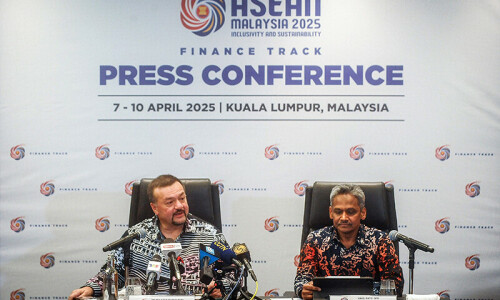In the aftermath of the Pulwama incident, shrill lobbies on both sides of the border have started beating the drums of war. Particularly jarring are the armchair warriors of the media — especially on the Indian side — baying for the blood of the ‘other’.
There has also been a reprehensible effort to exploit the attack and work up anti-Kashmiri and anti-Muslim sentiments in India, predominantly by the storm troopers of Hindutva. But perhaps what is most worrisome is that ministers and members of the establishment on both sides are talking casually about war.
As saner minds in India and Pakistan have pointed out, “war is no picnic”, and a conflict will have devastating consequences for the entire subcontinent. Moreover, the Pulwama incident — gory as it was — was not a Mumbai-like militant attack targeting civilians. It was an indigenous reaction to India’s brutish tactics in held Kashmir, so laying the blame at Pakistan’s door will not make the core issue go away.
However, amidst the din of war, there are some sensible statements coming from the top leadership in Islamabad and Delhi. Over the weekend, Indian Prime Minister Narendra Modi mentioned an earlier conversation with Imran Khan in which he had made an offer to his counterpart to fight illiteracy and poverty together. Mr Khan replied favourably on Sunday, once again asking the Indian side to provide “actionable intelligence”, if it had any, of Pakistani involvement in the Pulwama episode.
In such a tense atmosphere, India should take up Pakistan’s offer to “give peace a chance” as the alternatives to constructive dialogue are confrontation and yet more hostility.
While the respective leaders have done the right thing by toning down rhetoric, it is time this had a trickle-down effect on ministers and senior government functionaries indulging in war talk.
As three former foreign secretaries of Pakistan have written in this paper, war in the nuclear age is a catastrophic proposition.
Previous Pakistan-India wars were different affairs; this time both belligerents have powerful nuclear arsenals, which should be enough of a deterrent to convince both security establishments and their political counterparts to prefer negotiations to the battlefield.
The fact is that both states need to introspect and consider what steps can be taken internally to promote peace in the subcontinent.
In India’s case, Hindutva ideologues have infiltrated all levels of the state machinery; this has resulted in an increasingly rigid attitude towards Pakistan. Moreover, the Indian military’s brutal tactics in occupied Kashmir have fired up Kashmiri resistance, with the region’s disillusioned youth convinced that only armed struggle against India will help them secure their rights. But it is also true that Pakistan can take steps to send positive signals across the border. Among these can be speeding up the legal process to bring the perpetrators of the Mumbai attack to justice.
Published in Dawn, February 26th, 2019















































